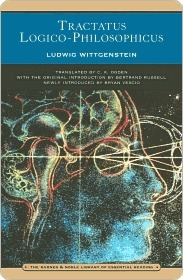More on this book
Community
Kindle Notes & Highlights
Read between
November 13, 2019 - January 22, 2020
Facts which are not compounded of other facts are what Mr Wittgenstein calls Sachverhalle,
The logical picture of a fact, he says, is a Gedanke.
It results from this view that nothing correct can be said in philosophy.
Thus the whole business of logical inference is concerned with propositions which are not atomic. Such propositions may be called molecular.
What we cannot think we cannot think, therefore we also cannot say what we cannot think.
This, he says, gives the key to Solipsism.
The metaphysical subject does not belong to the world but is a boundary of the world.
The whole subject of ethics, for example, is placed by Mr Wittgenstein in the mystical, inexpressible region.
What can be said at all can be said clearly ; and whereof one cannot speak thereof one must be silent.
so we cannot think of any object apart from the possibility of its connexion with other things.
The essential nature of the propositional sign becomes very clear when we imagine it made up of spatial objects (such as tables, chairs, books) instead of written signs.
that it is only a description of symbols and asserts nothing about what is symbolized.
In the language of everyday life it very often happens that the same word signifies in two different ways-and therefore belongs to two different symbols-or that two words, which signify in different ways, are apparently applied in the same way in the proposition.
nor does our phonetic spelling (letters) seem to be a picture of our spoken language. And yet these symbolisms prove to be pictures-even in the ordinary sense of the word -of what they represent.
Philosophy is not one of the natural sciences.
(The word " philosophy " must mean something
which stands above or below, but not beside the natural sciences.)
4.112 The object of philosophy is the logical clarification of thoughts.
Everything that can be thought at all can be
thought clearly. Everything that can be said can be said clearly.
Tautology leaves to reality the whole infinite logical space ; contradiction fills the whole logical space and leaves no point to reality.
Every possible proposition is legitimately constructed, and if it has no sense this can only be because we have given no meaning to some of its constituent parts.
Empirical reality is limited by the totality of objects. The boundary appears again in the totality of elementary propositions.
The hierarchies are and must be independent of reality.
Here we see that solipsism strictly carried out coincides with pure realism. The I in solipsism shrinks to an extensionless point and there remains the reality co-ordinated with it.
5.641 There is therefore really a sense in which in philosophy we can talk of a non-psychological I.
All propositions, such as the law of causation, the law of continuity in nature, the law of least expenditure in nature, etc. etc., all these are a priori intuitions of possible forms of the propositions of science.


